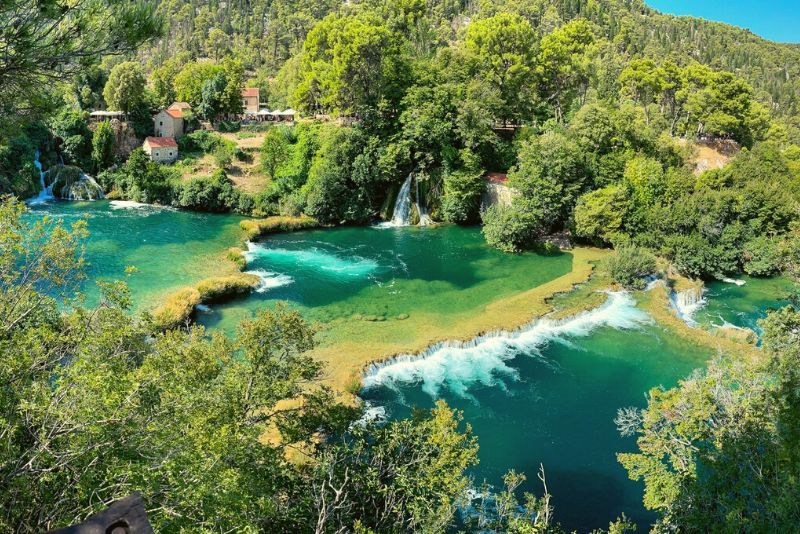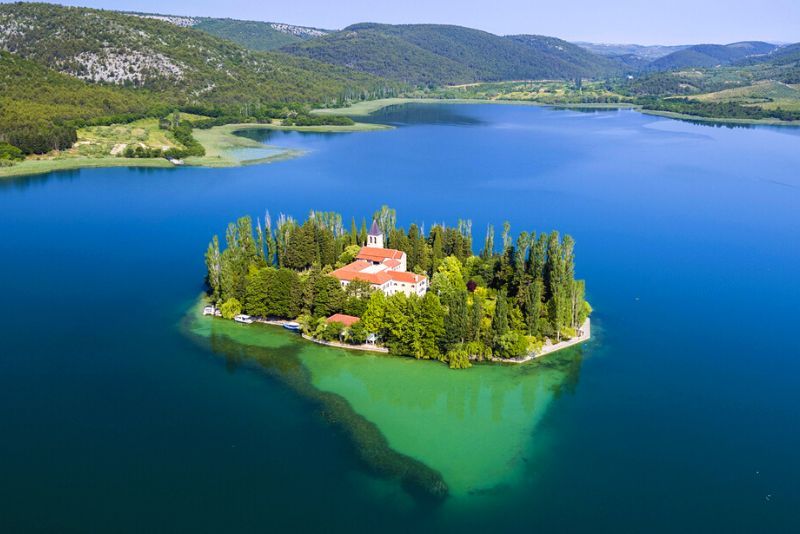Krka National Park: Day Trips and Tours from Split
Just a short drive outside of Split sits Krka National Park. Visitors from near and far travel to this part of Croatia to take in the views, see the flora and fauna up close and marvel at the grand waterfalls.
It has been a national park since 1985 and helps protect the river while simultaneously offering visitors a unique experience. Krka National Park is home to some of the most famous waterfalls in the country.
Just a short drive outside of Split sits Krka National Park. Visitors from near and far travel to this part of Croatia to take in the views, see the flora and fauna up close and marvel at the grand waterfalls.
It has been a national park since 1985 and helps protect the river while simultaneously offering visitors a unique experience. Krka National Park is home to some of the most famous waterfalls in the country.

(0/24) checking Musement...
Just a short drive outside of Split sits Krka National Park. Visitors from near and far travel to this part of Croatia to take in the views, see the flora and fauna up close and marvel at the grand waterfalls.
It has been a national park since 1985 and helps protect the river while simultaneously offering visitors a unique experience. Krka National Park is home to some of the most famous waterfalls in the country.
Consider planning a day trip to Krka National Park on your next trip to Croatia!

How to get to Krka National Park from Split?
Krka National Park only sits about 80 kilometers northwest of Split. The short distance between the two locations makes it a perfect day trip to soak in the beauty of Croatia. You can make the journey to the park by car, public transportation or on a guided tour.
From Split to Krka National Park by car
The jaunt from Split to Krka National Park takes about one hour in a car. You can take a variety of routes to reach the park. The fastest option is to take the E65/E71 toll road, but you can also travel via the D1 or D8.
From Split to Krka National Park by public transportation
Using public transportation is not the best method to reach the park since it does not take you directly to the destination. You can travel on the FlixBus from Split Central Bus Station to Skradin, a town about 25 kilometers from the park. This leg of the journey takes about 1.5 hours. From there, you must take a taxi.
Guided tour to Krka National Park from Split
If you are unable or unwilling to drive yourself, consider booking a guided tour to the park. These tours offer convenient options to get you to and from Split while exploring all the Krka National Park has to offer.
Each day tour typically includes round-trip transportation, a guide and a driver in the cost. You can sit back and relax along the way!
How much does the entrance ticket to Krka National Park cost?
The Krka National Park entrance fee varies based on how old you are, when you visit, where you visit and whether or not you take a boat around the park.
- Adults: HRK200 (US$28)
- Children (aged 7-18): HRK120 (US$17)
- Students: HRK120 (US$17)
The student price is applicable only in summer to enter on foot to view the Skradinski buk.
You will pay slightly more to enter by boat or bus. Keep in mind that the boats do not operate during the winter.
The prices fluctuate throughout the year. You may even see them as low as:
- Adults: HRK50 (US$7),
- Children (aged 7-18): HRK30 (US$4)
- Students: HRK30 (US$4)
Children under 7 years old and people with reduced mobility always get in for free.
You can also purchase tickets that only give you access to certain areas of the park. You can purchase your tickets in person, but it is best to buy them ahead of time to guarantee your spot.
What is the typical itinerary of a day tour to Krka National Park from Split?
Each tour offers visitors a unique experience and follows its own itinerary. Your day will look a little different depending on what your tour includes and how many stops it makes.
For the most part, the tours start in Split. You will make your way to a designated meeting spot or your tour operator will pick you up directly at your accommodation. Your group will then depart Split and head towards Krka National Park.

You will have free time to explore the park on your own or with other people in your group. You can walk along the trails, marvel at the waterfalls or explore by boat. Most day tours include a boat ride around the park, but it is best to confirm with your tour operator.
After exploring the park, your group may head towards neighboring towns to swim in the river or do wine and olive oil tastings.
Your group will then make their way back to Split after a day of exploring. Confirm with your tour operator if they will drop you off directly at your accommodation or back at the designated meeting spot.
What kinds of tours are available to go to Krka National Park?
You have many options to choose from if you decide to book a guided tour from Split to Krka National Park.
Day tour to Krka National Park from Split with a boat cruise
Each day tour offers you a slightly different experience. You will join travelers from all over the world on your tour, as you explore all that Krka National Park has to offer.
You will have ample free time to hike, swim, soak up the sun or take a boat cruise. The tours typically include transportation, a guide, a driver, a boat cruise and entrance fees to the national park.
Private tour to Krka National Park from Split
Private tours to Krka National Park typically follow the same itinerary as regular day tours, but they are confined to the members of your group. They give you a more intimate setting and also allow for more scheduling flexibility.
These may be the most cost-effective option for small groups because you pay per group, not per person.
Day tour to Krka National Park from Split with wine tasting
If you are looking for a tour that allows you to experience a bit more of Croatia, consider booking a day tour that includes a wine tasting. After you explore Krka National Park, your group will make their way to a nearby town to enjoy local wine.
Free walking tour in Krka National Park
A free walking tour of Krka National Park is the perfect budget-friendly option. After making your way to the park, you can reserve a spot on a free walking tour. A professional guide will lead you all over the park while pointing out points of attraction. These tours cost nothing to join, but you should expect to tip the guide at the end.

How much does a tour to Krka National Park from Split cost?
Traveling from Split to Krka National Park on a guided tour can be a cost-effective method. The tours typically include round-trip transportation, a driver, a professional guide, entrance fees and sometimes snacks or beverages.
The cost of each tour greatly varies based on how many stops it makes, which company operates the tour, how long it lasts, when you take it and whether or not it is a private tour. The tours from Split to Krka National Park cost anywhere from €12 to €620.
If you want to save money, you can make your way to the park and join a free walking tour. You do not have to pay for the tour itself, but we advised tipping the guide after the tour. You can surely find a tour that suits your budget!
What will you see and do in Krka National Park?
Once you arrive at Krka National Park, you have to decide which of the three main attractions you would like to see and purchase your ticket accordingly.
Skradinski buk
Skradinski buk is one of the most frequently visited and beautiful parts of the park. It is home to 17 waterfalls that spill into a crystal clear natural pool. Many people consider it to be one of the most beautiful calcium carbonite waterfalls in Europe.
Roški Slap
In terms of visitors, Roški Slap is the second most popular attraction in Krka National Park. It is the sixth waterfall along the Krka River. The area houses beautiful hiking and walking trails. You can reach the waterfall on a boat operated by the park or a public road.
Visovac
Last but not least is Visovac, a small island in the middle of the park. The island houses the Visovac Monastery and the Eastern Orthodox Monastery Krka. You can visit the island on a boat tour operated by the park.
Aside from these three main attractions, you can take advantage of the great outdoors while at Krka National Park. You can walk, hike, swim or take in the sights. Most tours also include a boat ride around the area, one of the best ways to see the entirety of Krka National Park.

When is Krka National Park open over the year?
Krka National Park remains open to visitors all year, except on Dec. 25 and 26.
What are the opening times?
The park has different operating hours throughout the year. You can access Skradinski buk with the following schedules:
- November to February: 9 AM to 4 PM
- March and Oct. 16-31: 9 AM to 5 PM
- April and Oct. 1-15: 8 AM to 5 PM
- September and May: 8 AM to 7 PM
- June to August: 8 AM to 8 PM
When is the best time to visit Krka National Park?
Everyone has a different answer when you ask them what the best time to visit Krka National Park is, but it all depends on your personal preference!
That part of Croatia experiences milder weather, so there is no bad time to go. You can go in the summer to soak up the warm and sunny days, but you will also find higher prices and more crowds. You can only swim at the Skradinski buk falls from June 1 to Sept. 30.
You can expect to pay a lower entrance fee and see smaller crowds if you visit in May, June, September or October. The spring is also a great time to see the park’s flora in full bloom.
If you can withstand the cooler temperatures and don't plan on swimming, consider visiting in the winter. These are some of the rainiest months of the year, so the falls will have much more power than in other months. Keep in mind that the park does not operate boat tours during the winter months.
Are there any tours to Krka National Park from other cities in Croatia?
Yes, there are other tours departing from several other cities in Croatia:
- Krka National Park day trips from Zadar
- Day trips to Krka National Park from Trogir
- Krka National Park day tours from Zagreb
- Day trips to Krka from Dubrovnik
Travel tips
- The park allows visitors to swim in some areas, so pack your bathing suit and towel!
- Decide which attractions you would like to see and purchase your ticket accordingly.
- Purchase an entrance ticket that includes a boat ride if your tour does not take you on a boat.
